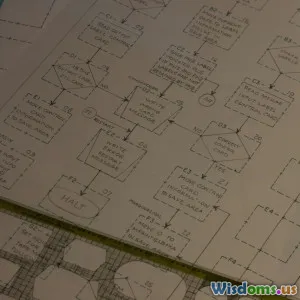
What Time Management Secrets Can We Learn from Benjamin Franklin
8 min read Discover Benjamin Franklin's timeless time management strategies to boost productivity and life balance. (0 Reviews)
What Time Management Secrets Can We Learn from Benjamin Franklin
Benjamin Franklin, one of America's most illustrious Founding Fathers, was not just a diplomat, inventor, and writer—he was a master of time management. His profound contributions to society were undeniably supported by his exceptional ability to command his day. In an era long before time-management apps and productivity hacks, Franklin pioneered systemized approaches that can still inspire and guide today's busy professionals.
Introduction: Why Benjamin Franklin’s Time Management Still Matters
In our distraction-filled world, finding effective ways to manage our hours feels like a modern challenge. Yet, if we look back 300 years, Benjamin Franklin was already solving those very issues with keen insight. Beyond his celebrated inventions and political achievements, Franklin’s disciplined daily routines and strategic planning gave him the leverage to excel continuously. By delving into Franklin's personal habits and philosophies, we unlock timeless secrets on how to steward our time better.
Franklin's Daily Question: A Framework for Prioritization
One of the most famous quotes attributed to Franklin illustrates his approach succinctly:
“What good shall I do this day?”
Each morning, Franklin would rise early and ask himself how he could make the day meaningful. This question wasn’t just rhetorical—it served as a guiding beacon to prioritize his efforts. In practical terms, this ritual embodies the principle of intentional living and goal-driven time management.
Applying the Morning Reflection
By starting the day with clear intent, Franklin avoided aimless wandering or reactive work patterns. Today, this can translate to:
- Writing down the top 3-5 important tasks each morning.
- Aligning daily efforts with broader personal or professional goals.
- Ensuring that every action has a purpose rather than chasing distractions.
Research shows that setting explicit goals improves focus and productivity dramatically. Franklin's simple habit echoes the same neuroscience-backed principle that goal-setting enhances motivation.
Structured Routine: The Backbone of Franklin's Productivity
Franklin’s time was meticulously planned, as revealed in his autobiography, where he outlines a rigid daily schedule divided into segments like:
- 5:00 am–8:00 am: Rise, wash, address important tasks like planning.
- 8:00 am–12:00 pm: Work hours for various projects.
- 12:00 pm–1:00 pm: Lunch and rest.
- 1:00 pm–5:00 pm: Continue work or personal development.
- 5:00 pm–10:00 pm: Social activities, reflection, and preparation for bed.
The Power of Time Blocking
Franklin's schedule exemplifies modern time blocking—allocating fixed time slots for specific activities. This method:
- Minimizes multitasking, improving focus.
- Helps reduce decision fatigue by pre-planning the day.
- Encourages work-life balance by clearly earmarking downtime.
Today, productivity experts routinely endorse time blocking to sustain deep work sessions and avoid burnout. Franklin's routine reminds us how intentional structure can elevate output without sacrificing well-being.
The Evening Question: Reflection and Accountability
Franklin didn’t just start with a question; he ended his day by asking:
“What good have I done today?”
This reflection encouraged honesty and continuous improvement. Taking stock of one's actions fosters accountability, helping to recognize wasted efforts and celebrate accomplishments.
Implementing Daily Reviews
Modern productivity systems, including the popular Getting Things Done (GTD) methodology by David Allen, emphasize weekly or daily reviews to track progress. Franklin integrated this naturally centuries earlier, highlighting:
- Self-awareness as a catalyst for growth.
- Pattern recognition in personal productivity.
- Emotional satisfaction from recognizing meaningful efforts.
As studies illustrate, people who regularly self-reflect and journal experience enhanced mental clarity and motivation. Franklin’s evening habit encapsulates this with elegance and simplicity.
Balance Between Work and Rest
Franklin was not a relentless workaholic. He understood the necessity of leisure, social gatherings, and sufficient rest. His schedule carved out ample time for:
- Socializing, which he believed enriched the mind.
- Reading and self-education.
- Proper sleep to show up refreshed.
Why This Matters
Time management isn’t solely about squeezing more hours of work—it’s about optimizing overall life satisfaction. Franklin’s holistic approach preempted modern understanding of work-life balance, a principle shown to boost creativity, health, and long-term productivity.
Franklin’s Virtue of Frugality: Time as Currency
Benjamin Franklin prized frugality not just with money but with time. He famously stated:
“Lost time is never found again.”
He regarded time as the most precious commodity. By treating time like money—spending it wisely, avoiding waste—Franklin ensured maximum returns for his efforts.
Practical Applications
This economical attitude towards time prompts us to:
- Limit activities that bring little reward.
- Be mindful of meetings, emails, or social media that devour attention.
- Value blocks of uninterrupted time for deep work.
By living this way, Franklin avoided common modern pitfalls where hours pass amid shallow work or distractions.
Legacy and Lessons for Today
Fast-forward to today: executives, creators, and students still find inspiration in Franklin’s patterns. His approach blends foundational behavioral tools every individual can incorporate.
Key Takeaways:
- Begin with Intent: Define your day’s purpose to steer actions.
- Segment Your Time: Use structured blocks to enhance focus.
- Reflect Daily: Assess your impact critically to grow.
- Embrace Balance: Prioritize rest and social time.
- Respect Time: Treat it as your most valuable resource.
By adopting even a fraction of Franklin’s techniques, anyone can increase their productivity and deepen life satisfaction.
Conclusion
Benjamin Franklin wasn’t merely a man of great inventions and politics; he was a pioneer of managing the essence of life—time itself. At a time devoid of digital clocks or productivity apps, his disciplined habits carved a path to genuine accomplishment and well-being. Today, by honoring his principles—intentionality, planning, reflection, and balance—we can reclaim our days and thrive amid modern demands. Franklin’s timeless counsel continues to empower those willing to master their most precious resource: time.
Rate the Post
User Reviews
Popular Posts

















